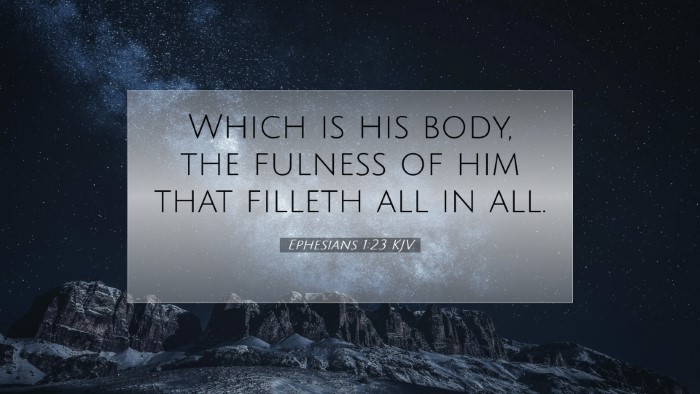Ephesians 1:23 Commentary
The Apostle Paul, in his epistle to the Ephesians, articulates profound truths about the nature and significance of the Church through a rich and multi-faceted lens. Ephesians 1:23 states, "Which is his body, the fullness of him that filleth all in all." This verse encapsulates vital theological concepts concerning the relationship between Christ and the Church, which demands careful examination from various esteemed commentaries.
General Overview
This verse serves as a conclusion to Paul's overarching discourse on Christ's exaltation and His role in relation to the Church. Here, Paul emphasizes that the Church is not an institution of mere human organization but is intimately connected to Christ as His body.
1. The Nature of the Church as the Body of Christ
Matthew Henry notes that the Church, being the body of Christ, indicates the unity and diversity of believers coming together under the headship of Christ. He asserts that just as a human body comprises various members that function together, so does the Church consist of diverse individuals bound in Christ.
Unity and Diversity
Henry further emphasizes this unity in diversity: "The church is the body of Christ, which includes all believers, representing the fullness of Him." This points to the local and universal aspects of the Church, where every individual contributes to the overall health and vitality of the body.
2. The Fullness of Christ
Albert Barnes expounds on the phrase "the fullness of him" by pointing to Christ's supply to His body, the Church. Barnes states, "Christ is in the Church as the source of life, light, and strength." This fullness is not merely a physical analogy but speaks to spiritual sustenance provided by Christ.
Spiritual Implications
- Life and Vitality: Just as the body cannot function without its head, the Church draws spiritual life directly from Christ.
- Empowerment: The Church, being the embodiment of Christ, carries out His works in the world, empowered by His presence.
3. The Cosmic Significance of the Church
According to Adam Clarke, this verse extends beyond the immediate scope of believers; it has cosmic implications. Clarke interprets "that filleth all in all" as indicating that Christ's influence permeates every aspect of life, not just the ecclesial community.
Theological Amplification
Clarke asserts, "The Church, as the body of Christ, showcases that His dominion spans both heaven and earth." This highlights the Church's role in manifesting God’s glory in all spheres of life.
Theological Reflections
In examining Ephesians 1:23, it is essential to draw on the rich theological implications this passage offers. Paul’s writing suggests several critical areas of reflection for pastors, students, and scholars alike:
1. Christological Significance
Understanding Christ as the head of the Church is foundational. The nature of the Church as His body suggests an intrinsic relationship that shapes the identity and function of believers.
2. Ecclesiological Application
The implications for ecclesiology are profound, inviting individuals to engage with the Church not just as an institution but as a divinely ordained community that reflects the life of Christ.
3. Missional Aspect
Ephesians 1:23 also has a missional component, encouraging the Church to realize its role in fulfilling God's purposes on earth. In being the body of Christ, believers are called to extend His influence within the world.
Practical Implications for Ministry
- Empowering Believers: Pastors are encouraged to empower their congregations to grasp their identity and responsibility as members of Christ's body.
- Unified Approach: The local church should reflect unity amid diversity, working collaboratively for God's glory.
Conclusion
The richness of Ephesians 1:23 serves as a powerful reminder of the Church's identity and mission rooted in Christ. Through the insights of Matthew Henry, Albert Barnes, and Adam Clarke, we gather a comprehensive understanding that not only enriches our theological knowledge but also empowers our practical engagement in ministry.


